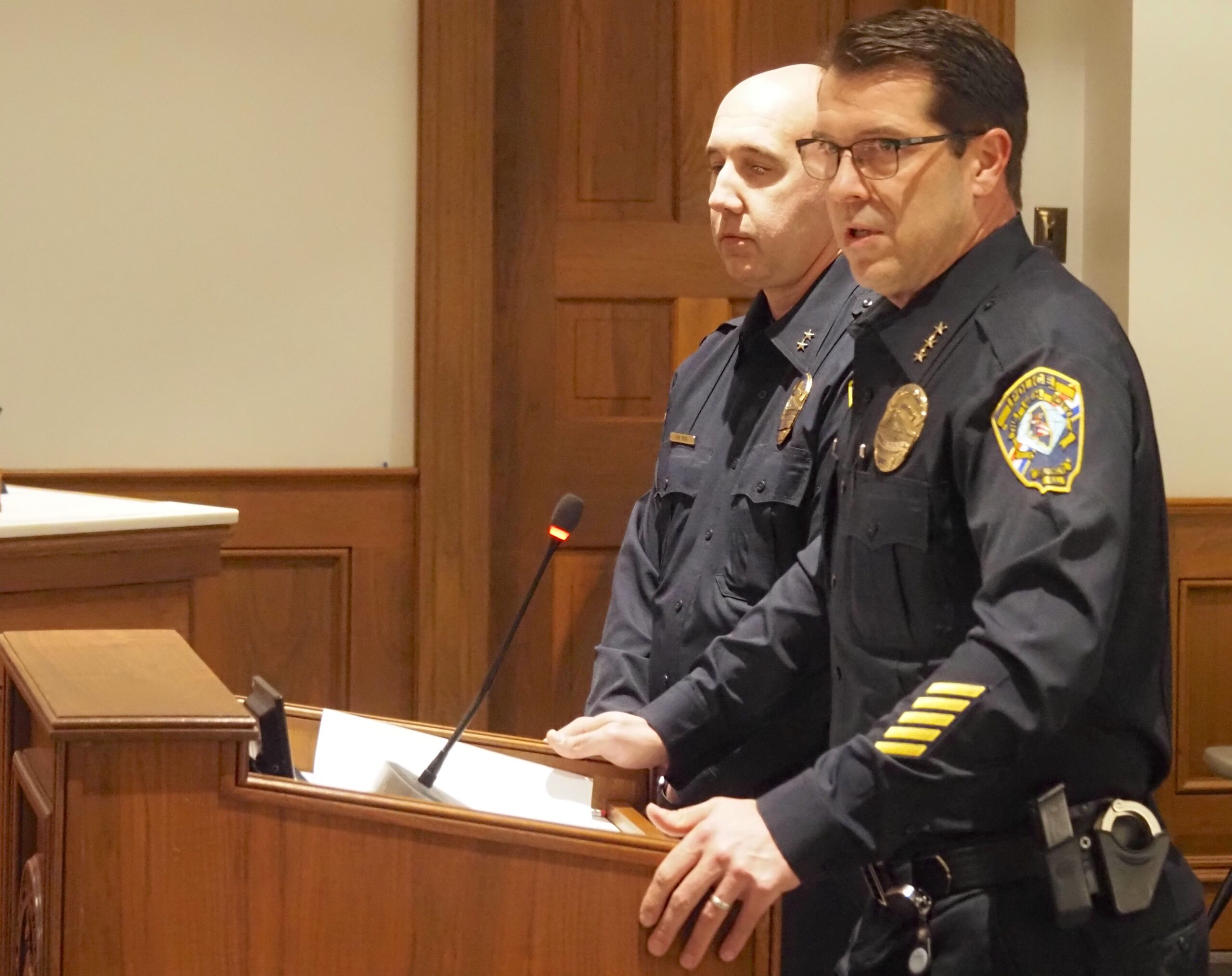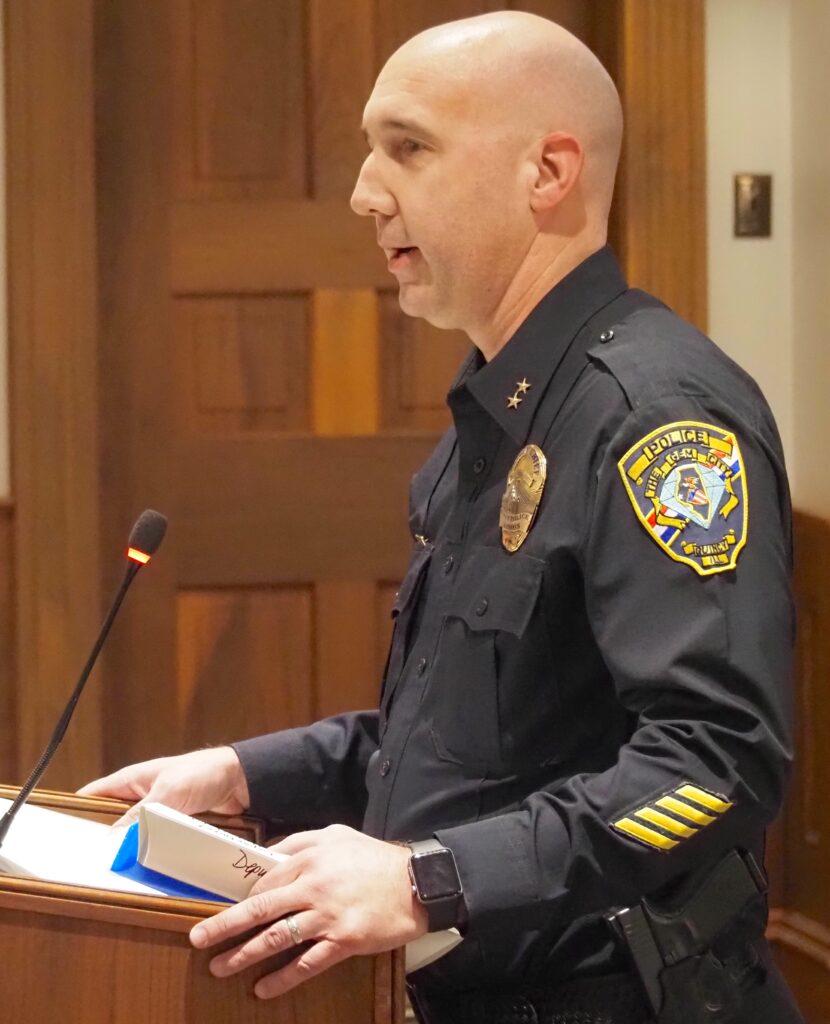Yates proposes ordinance that gives QPD more reasons to tow vehicles — then charge $200 fee to get them back

QUINCY — The Quincy Police Department is asking the Quincy City Council to approve a proposed ordinance that allows officers to impound and tow motor vehicles for multiple violations at the owner’s expense, with a $200 administrative fee to be required before the vehicle is released.
Adam Yates, chief of the Quincy Police Department, explained to aldermen during Monday night’s meeting that QPD officers now are authorized and required to tow vehicles for only two reasons — the driver is arrested for driving under the influence, or the driver is operating the vehicle without a valid driver’s license and with no insurance.
Yates said his department has towed 126 vehicles for those two reasons. The owner of the vehicle in those situations must only pay the tow company towing and storage fees to retrieve their vehicle.
“If you don’t commit any crimes and you have a driver’s license while you’re driving your car, this ordinance means absolutely nothing to you,” Yates told aldermen. “The purpose of this ordinance is to, one, expand the number of violations that we tow vehicles for, and two, to implement an administrative fee that we charge for vehicles that we do tow because of the amount of paperwork and manpower that it takes to tow people.”
Yates listed in a Dec. 26 letter to Mayor Mike Troup (that was distributed to aldermen) the factors and estimated costs that go into the towing of a car:
- The number of officers involved (typically two) and the time (approximately 60 minutes) they spend on the call: $84
- The amount of time the department’s fleet manager spends on drafting letters and processing disposition paperwork: $62.50
- The cost of certified mail: $26
- The time the watch commander spends processing release paperwork: $9
- The time squad cars are out of service due to a towing incident: $44.40
Yates explained that Illinois law allows a law enforcement agency to establish a local ordinance authorizing police to impound motor vehicles for a wide variety of traffic and criminal offenses. He proposes to add 10 more reasons to allow a QPD officer to tow a vehicle:
- Possession or delivery of a controlled substance
- Possession or delivery of methamphetamine
- Driving under the influence
- Driving with a suspended or revoked driver’s license or driver’s license expired for more than one year
- Fleeing or attempting to elude a police officer
- Leaving the scene of a personal injury or property damage crash (hit and run)
- Unlawful use of or possession of a weapon by a felon
- Aggravated or reckless discharge of a firearm
- Aggravated unlawful use of a weapon
- Any forcible felonies
“If you were to commit aggravated or reckless discharge of a firearm in your living room, like you shoot your friend because you’re mad because he beat you at PlayStation, there’s nothing to do with your vehicle, so we’re not going to tow your car,” Yates said. “You’ll get arrested, but we’re not going to also drive into your driveway, hook your car and take it with us.
“But if you do drive over to your friend’s house and shoot at his front door from your vehicle, and we catch you, then we are going to tow your car for an offense of that nature.”
Yates said his department has put many hours into towing the vehicles at no cost to the criminals.
“One of the things we deal with probably more often than anybody realizes is people who are driving on suspended or revoked driver’s licenses,” he said. “We arrest three or four people a week for driving without a valid driver’s license. These people are operating vehicles that shouldn’t be on the roads, and they are getting into crashes. They’re doing things on the road they shouldn’t be doing because (the vehicle) shouldn’t be there to begin with.
“If we stop somebody and they have a suspended driver’s license, in most cases, we write them a ticket, tell them not to drive, and we leave. There’s not really anything else that we can do. We felt like it’s time that we start separating these folks from their vehicle, at least for a short period of time.”
Yates said he doesn’t intend for his department to begin enforcing the ordinance, if approved by the City Council, until March 1. It gives him time to educate his officers on protocols and standard operating procedures, create new forms and educate the community.
Alderman Glen Ebbing (R-5) asked Yates about criminals who don’t have the money to pay the $200 fee.
“How do you get blood out of a turnip?” he said.
“Then they don’t get their car back,” Yates replied. “Ultimately, the tow company submits to us for either junk or a lost title of some sort, and then they sell the vehicle or do whatever they need to do after that’s accomplished. That’s how they get their money back. We ultimately won’t get any money back, but I look at that like we’re not getting any money back right now for the vehicles that we’re towing.”
“I just want to say I’m very supportive of everything that you said,” Ken Hultz (R-3) said to Yates. “I think you’ve explained everything as thoroughly as you can possibly do it. I think it’s time to do it and do it now.”
Jake Reed (R-6) asked Yates to provide the City Council a list of other crimes that the could be added to the proposed statute.

“I kind of like the idea of maybe doing it for additional crimes like retail theft,” he said. “You come to our city and steal from us, and we’re going to take your car — and you may not get it back.”
Deputy Chief Mike Tyler said similar laws are enforced by the Adams County Sheriff’s Department, which has its own impound lot and tows cars for even more offenses listed in Yates’ proposed ordinance. He said he spoke to deputy chiefs in other Illinois cities, including Gaesburg, Freeport and Alton, and they all have similar ordinances.
Yates said all fees collected would go to the city’s General Fund.
At the beginning of Monday’s meeting, Yates read a proclamation acknowledging the 25-year anniversary of Tyler’s hiring. Tyler is the chief of operations of the police department.
“It’s probably one of the most difficult jobs in the police department,” Yates said. “As our internal affairs investigator, he handles all the stuff that none of us ever want to have to try to deal with, but it is probably one of the most important things in terms of maintaining discipline and transparency when the police department does a fantastic job. He’s a key part of my administration at the police department.”
Miss Clipping Out Stories to Save for Later?
Click the Purchase Story button below to order a print of this story. We will print it for you on matte photo paper to keep forever.

